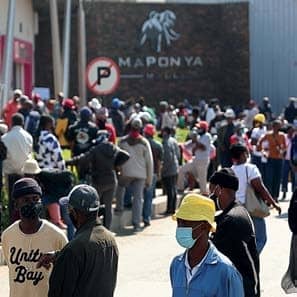
In the aftermath of the widespread looting of shops and businesses that took place across many parts of Gauteng and KwaZulu-Natal in July, there has been a flurry of insightful debates about the importance of developing low-income and unemployment-afflicted townships.
For over a week in July, South Africans were glued to their TV screens, watching thousands of people ransacking and pillaging shopping malls and small businesses in an orgy of violent unrest the country has not seen since the early 1990s.
After the dust had settled, more than 300 people had lost their lives while R50bn worth of damage had been unleashed on property and infrastructure in what President Cyril Ramaphosa described as a “failed insurrection”.
During the pandemonium, thousands of township-based shops and businesses took a huge financial knock, compelling the government to whip out R38.9bn to help affected businesses to reopen and rebuild their operations.
The riots will forever be etched in our memories. The riots reminded us of the re-enacted scenes on the History Channel of Barbarians pillaging Rome after defeating Roman legions on the battlefield. Who can forget the video that went viral of a looter who triumphantly ate a stolen cake inside a Shoprite store, with no care in the world of being arrested by the police for his crime?
The unrest sent shockwaves reverberating across the country, prompting several influential organisations and institutions to consider ongoing neglect of townships, home to about 60% of the South African population.
This story is from the 24 September 2021 edition of Finweek English.
Start your 7-day Magzter GOLD free trial to access thousands of curated premium stories, and 9,000+ magazines and newspapers.
Already a subscriber ? Sign In
This story is from the 24 September 2021 edition of Finweek English.
Start your 7-day Magzter GOLD free trial to access thousands of curated premium stories, and 9,000+ magazines and newspapers.
Already a subscriber? Sign In

THE HEALTH OF SA'S MEDICAL SCHEMES
As the Covid-19 pandemic abates, finweek takes a look at the financial performance of some of the largest players.

The effect of Gilbertson's departure
With Ntsimbintle Holdings now the major shareholder of Jupiter Mines, it could change SA’s manganese industry.

Making money from music
Why investors are increasingly drawn to the music industry.

Conviction is key
Sandy Rheeder plays a critical role in Mukuru’s mission to open up financial services to the emerging consumer market in Africa through tailor-made technology solutions and platforms.

The post-pandemic toolkit
How CFOs can use technology to support growth.

Big city living exodus
Mini cities like Waterfall City and Steyn City are redefining city-style apartment living.

Big compact, big value
Handsome, with a hefty level of standard specification, the roomy Haval Jolion compact crossover is a great value proposition.

On barriers to entry
There are various ways in which a company or sector can achieve competitive dominance. They usually make for good investments.

Fear and greed in one index
To buck the trend, when markets are hot or cold, is a tough thing to do. However, it can deliver solid returns.

Africa's largest data centre facility coming soon
Vantage Data Centers plans to invest over R15bn for its first African data centre facility in Attacq’s Waterfall City.